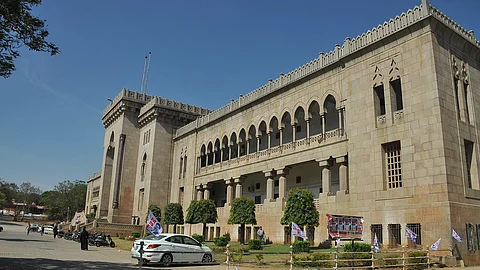

Osmania University has imposed a ban on student agitation and protest in the university campus, citing the smooth functioning of the academic and administrative processes as the reason for the decision.
The university had earlier issued a circular dated March 13, restricting any protest activities in the campus, which was met with criticism from students.
University Registrar Prof G Naresh Reddy on Sunday, March 16, issued an official statement clarifying the decision as he said that content of the circular was misinterpreted and misunderstood by the various stakeholders.
The university administration said:
"It is important to clarify that the circular does not impose a blanket ban on student protests or agitations in open spaces within the university. The restrictions apply exclusively to the academic and administrative spaces within college departments and administrative premises. The aim of the circular is to prevent disruptions that interfere with the smooth functioning of the university's academic and administrative processes. Unfortunately, recent incidents, such as unauthorized occupation of the Principal's room at Nizam College, disruptive activities at the University College of Arts & Social Sciences, and the forcible occupation of the Registrar's Office for over four hours, have significantly hindered essential academic and administrative work."
The administration stressed that it recognised the significant role of the student movements and that it supported the students' rights to peaceful protest, but urged to conduct such activities in campus in the spaces where they will not interfere with academic or administrative functions.
The registrar reiterated that the circular was issued to ensure that the university provides a conducive environment for learning, research, and institutional growth, stated a report by The New Indian Express.
The university said:
"As Osmania University strives to secure global rankings and gain national and international accreditations, it is crucial that we maintain a stable academic environment and efficient administration. Disruptions to our academic and administrative functions can have a detrimental impact on the university's progress, affecting the quality of education and research that we offer. Additionally, it is critical to understand that the circular does not infringe upon the fundamental right of students to express grievances. The university remains committed to providing transparent and accessible grievance redressal mechanisms. Students are encouraged to raise their concerns through formal institutional channels. If further resolution is required, students are invited to meet with university officials, including the Registrar, in a structured and respectful manner. This process ensures that grievances are addressed in a constructive way, without resorting to disruptions that hinder academic progress."
The decision was met by criticism from the opposition parties who said that the decision was a direct attack on the democracy.
Bharat Rashtra Samithi (BRS) working president KT Rama Rao strongly condemned the move. He questioned whether this was the "spirit of democracy" that Rahul Gandhi and the Congress had repeatedly spoken about while advocating for the right to protest.
"Is this the democratic right of protest that Rahul Gandhi and the Congress claimed to uphold? If Congress truly believed in democracy, why is it resorting to authoritarian measures to silence student voices?" KTR said.
Slamming the Congress' double standards, KTR reminded the public that the party, during its election campaign, had promised the right to protest as part of its Seventh Guarantee. However, in just over a year, the same Congress government had betrayed that promise by imposing restrictions on student protests.
KTR also pointed out the repeated instances of Bharatiya Janata Party (BJP)-led union and state governments cracking down on student movements in universities across the country. He accused the Congress of following the same dictatorial approach in Telangana, proving that it was no different from the BJP when it came to suppressing dissent, according to a report by The New Indian Express.
"Suppressing student voices is a clear symbol of dictatorship. The Congress government in Telangana is now revealing its true colors by curbing students' fundamental right to protest. Osmania University, which played a crucial role in the Telangana movement, is now being turned into a prison under this oppressive rule," he said.
